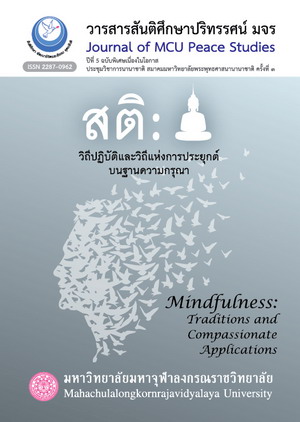A Study of Buddhadhamma Applying for in Solving the Problems of Consumerism of Youth in Ubonrachathani Province
Main Article Content
บทคัดย่อ
This research entitled ‘A Study of Buddhadhamma Application for Solving the Consumerism Problems of Youth in Ubonrachathani Province had three objectives: 1) to study the consumerism concept of the contemporary youth, 2) to study the consumption concept in Buddhism, and 3) to apply Buddhadhamma for solving the consumerism problems of the youth in Ubonratchathani Province.
The study revealed that the youth is a stage of changing behavior from childhood to adult. The youth’s behavior of consumption is mainly based on addiction in materials, luxury goods and over consumption. As the result, it leads to three main problems: 1) physical crisis, 2) mental crisis, and 3) social crisis.
For the consumption according to Buddhism, there are nine principles of ideal consumption. They are: 1) Yonisomanasikara, critical reflection, 2) Indriyasamvara, Sense-restraint, 3) Sati and Sampacanna, mindfulness and awareness, 4) Bhojane mattannuta, moderation in consumption, 5) Majjhimapatipada, moderate way, 6) Santosa, contentment,7) Gihisukha, household life happiness, 8) Vatthanamukha, channels of growth, and 9) Ditthadhammikattha, virtues conducive to benefits in the present. Whereas, there are three principles that contrast with the consumption in Buddhism: 1) Tanha, desire, 2) Akusalamula, root causes of bad deeds, and 3) Apayamukha, causes of ruins.
Accordingly, applying of Buddhadhamma for solving the problems of youth consumerism in Ubonratchathani Province; there are the twenty samples in which ten students are studying in each institution; ten students at Mahachulalongkornrajavidyalaya University in Ubonratchathani Campus, and ten students are studying in Ubonratchathani Vocational College. All of the students accepted that all the aforesaid Buddhist principles for consumption that are effectively applicable for solving the consumerism problems.
Article Details
ทัศนะและความคิดเห็นที่ปรากฏในบทความในวารสาร ถือเป็นความรับผิดชอบของผู้เขียนบทความนั้น และไม่ถือเป็นทัศนะและความรับผิดชอบของกองบรรณาธิการ ยินยอมว่าบทความเป็นลิขสิทธิ์ของวารสาร


